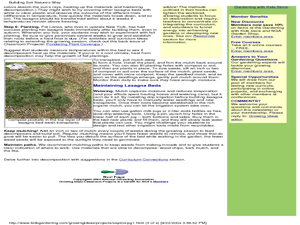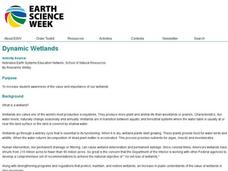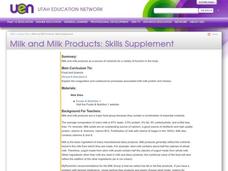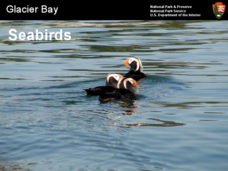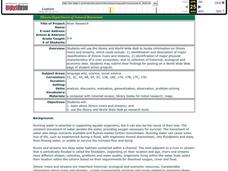Curated OER
Building Soil Nature's Way: Exploring decomposition and soil health
Young scholars explore decomposition and soil health by creating their own garden. For this agriculture lesson, students build a "lasagna garden" with organic matter found in the area and plant perennials native to their region....
Curated OER
Week 3: Pollution Source and Effects
Lab groups set up an experiment to observe what happens over time in collected pond water when fertilizer, representing pollution, is added. This website does not include student lab sheets, but background information, materials, and...
NOAA
The Dead Zone
The fifth installment of a 23-part NOAA Enrichment in Marine sciences and Oceanography (NEMO) program defines dead zones and how they form. Pupils then examine data from the Gulf of Mexico to determine dead zone formation.
Curated OER
Hunger and Malnutrition
Young scholars recognize that our bodies cannot function without certain essential foods. In this hunger and malnutrition lesson, students become familiar with the problems associated with malnutrition such as medical problems, problems...
Curated OER
Dynamic Wetlands
High schoolers construct and observe a model of two different types of wetlands. In this wetlands lesson, students create a model of a wetland with constant drainage and a wetland that maintains a well-saturated soil. High schoolers...
Pennsylvania Department of Education
The Digestive System
Fourth graders simulate how the digestive system works. In this hands-on simulation, 4th graders complete six group activities that help students visualize how our body breaks down food into nutrients.
Curated OER
Chemistry In Plant Nutrition And Growth
Students investigate different factors that affect plant growth. They research the effects of water supply, radiant energy, air temperature, and soil temperature. Students also gather facts that influence plant nutrition that include the...
Curated OER
COMPARE SOILS BY GROWING PLANTS
The student will identify the difference in the rate of plant growth in three soils that vary in organic matter.1. Obtain three to four flowerpots, different types of soil, a record chart, three to five beans for each pot, and water....
Curated OER
Chemistry And The Nitrogen Cycle
Students investigate the factors that compose the nitrogen cycle. The harmful effects of acid rain and ozone depletion are also discussed in the lesson. Students define the nutrient that is often limiting to plant growth through...
Curated OER
Cells in the Making
Young scholars examine and research the parts of a cell, their functions, and life processes. They simulate how cells receive nutrients using coffee filters, water, and coffee, and construct cells using pudding, cookie dough, and candy.
Curated OER
Gardening for Beauty, Food, and Enjoyment
First graders create their own garden. In this plant lesson, 1st graders discover the essential elements for a plant to grow. They planted their own garden and read the amount of space needed and the sunlight preferred for each plant.
Curated OER
Do You See What I See?
Second graders view a teacher-created terrarium, and complete a KWL chart. They discuss what they can see, Students go on a nature walk and compare the schoolyard to the terrarium, discussing the roles of rocks, plants, soil, and water...
Curated OER
Sustainable Livestock
Young scholars investigate healthy eating habits by researching livestock. In this food sustainability lesson, students research the negative impact factory farming has on our environment due to pollution. Young scholars define...
University of Southern California
Mastering Microbes
Small but mighty! Learners explore the role of microbes in a healthy ecosystem. An engaging activity asks pupils to design an aquaponics system that demonstrates that healthy microbes are necessary to maintain the ecosystem.
ProCon
Milk
Milk: It does a body good ... or does it? Using the provided website, scholars sort through information to answer the question. They review a chart demonstrating lactose intolerance by ethnicity and region, and they also compare the...
Curated OER
The good microbes
The question posed for the class to consider; What would decay and what would not? They read the short passage on decomposition and microbes, then mark the items that would decay after a two-week period. A scientific investigation idea...
Curated OER
Milk and Milk Products: Skills Supplement
Explain the coagulation and coalescence processes associated with milk protein and cheese. List the components of milk and explain how each component is dispersed in the milk. Describe what happens when milk protein is coagulated Discuss...
Curated OER
Feed Me, Seymour
Students work in small groups to create posters illustrating the major facts and functions of plant organs. Within their groups, they assume the role of specialists creating specialized posters pertaining to the different parts of plants.
Curated OER
Glacier Bay Seabirds
A gorgeous collection of photographs take viewers on a virtual tour or Glacier Bay National Park with a focus on the seabirds living in the area. Adaptations to the polar climate are highlighted, different species of birds are displayed,...
Curated OER
Helping the Soil
In this soil conservation worksheet, students study and analyze two excellent ways to enhance soil conservation: compost heap and leaf-mould. Students review all the ingredients in making both.
Curated OER
Roots of the World
Students recognize consist stems, trunks, leaves, and roots. They compare different types of roots by observing and comparing photographs. Aterwards, they observe the growth of a lima bean plant and document changes in root and shoot...
Curated OER
Advanced Critical Reading: Salt
In this critical reading worksheet, students read a passage regarding salt then answer three questions based on the reading.
Curated OER
River Research
Students use the internet to research the streams and rivers found in Illinois. Using the information, they identify and describe the rivers and streams along with the physical characteristics of a river ecosystem. They share what they...
Curated OER
De"compost"ition
Students develop an understanding of the decomposition process and the parameters which influence the rate at which it occurs.
